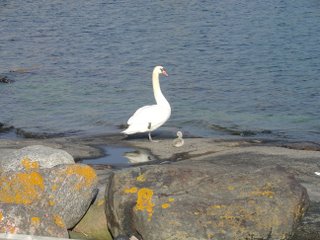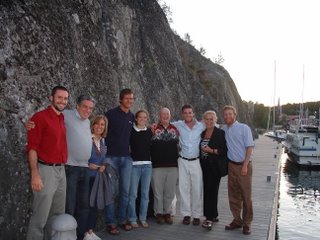June 30, 2006
Ship's Log
June 30th 2006
Departure Location: Sandhamn, Sweden
Departure Time: 13:15 hours
Distance Travelled: 16.5 nautical miles
Arrival Location: Name Unknown
Arrival Time: 19:00 hours
Weather: Very sunny and very light winds, periods of drifting
Personal Comments:
Today was the last day sailing in open waters and we spent most of it drifting aimlessly. Because there was no need to cover much distance we spent the morning sleeping in and running errands, and left Sandhamn in the early afternoon.
Our expectation was that we would sail for a few hours and get to our destination early enough to cook a big dinner and roam. The wind had other plans for us however. We started the afternoon with light winds and after a few hours ended up with no winds. Sunning ourselves on the back deck we would often look up to find that the boat had started to drift backwards because there was not enough pressure on the rudder to get any control. John even managed to take the dinghy out for a short row since it was clear that we would not be sailing away from him anytime soon.
Sometime around 18:00 hours we decided that we were done waiting for nature to guide us and turned instead to our trusty motor. Within 45 minutes we had arrived at our last port and an hour after that our feast was laid out. To our pleasant surprise a small motor boat, selling fresh baked bread and chocolates, pulled up beside us just as we were finishing dinner, providing a perfect end to a quiet day.
It was by far one of the laziest days that the team has spent since arriving and as you can see below, we did our best to take advantage of it.
Research Comments:
After three weeks of long winded discussions and sailing past hundreds of beautiful islands we have noticed that the one subject that comes up more often than most is the god Apollo and the many facets of the daily life he presides over. Because of this we thought it would be appropriate to pass some of this discussion on to you, our readers. Everything that is discussed below was composed by Professor Mullen, who has created a wonderful amalgam of thoughts about our most consistent literary companion; Apollo:
Earlier we mentioned how sailing past Applö, Vinci’s candidate for an island sacred to the god at which the Greeks might have stopped on their way to Troy (p. 165), made us thinking harder about the nature of this god, the one Greek clearly associated by cult and myth with the far north, the land of the Hyperboreans who live “beyond the north wind”. He is the god of antinomies:
· the sender of plague and the healer of it
· the god of radiance clarity, as in sunlight on promontories seen from afar, and the god who comes down “like night” at the beginning of the Iliad
· the wielder of the bow which sends death and player of the lyre which is the flower of life (and his feastday is at the new moon, when its curve resembles both bow and lyre)
· the god of purification; if, like Orestes, you shed kindred blood, you flee to his sanctuary to be purified.
How might all these attributes fit together in a single concept? And is there anything in our three weeks’ sailing which might help us to intuit that unifying concept? The last two nights we’ve been mesmerized by the appearance of the slim crescent of the new moon as evening comes on—a fit time to try to draw our thoughts together, at the end of our weeks centered around the summer solstice.
One way to approach him is through the role he plays in the Iliad. There he is what scholars have come to call an “adversary god” to the hero, in this case Achilles, whom he resembles (both are young men in perfect shape) and whom he frustrates. In fact Apollo enters the plot at four places to frustrate people and only at the end to bringing about healing. His first frustrating entry is obviously his sending of plague on the Greek army in Book One. At two key scenes where a Greek hero is so brilliant that day on the battlefield that he threatens to take Troy, Diomedes in Book Five and Patroclus in Book Sixteen, Apollo calls out terrifyingly to him Phrazeo kai khazeo!, “Take heed and fall back!” In the case of Patroclus the first to strike him a deathblow is the god Apollo, and only later does the mortal Hector finish him off. And at the beginning of the book in which the climactic killing of Hector by Achilles is destined to occur, Apollo taunts Achilles in six chilling lines (8-13) which Achilles answers in six more lines of almost precisely the same structure and rhythm (15-21). Once Achilles seems to have foreknowledge through his mother’s prophecy that his final death at Troy will come through Apollo’s arrows (21.277-8). Insofar as we identify with the mortal hero Achilles we find Apollo mainly an adversary and a threat.
All this, however, is reversed in the final book. There we see, as Jonathan Shay shows so clearly in Achilles in Vietnam, that Achilles is still traumatized and bestialized by the berserker state triggered at the death of his best friend; even after Patroclus’ elaborate funeral in Book 23 Achilles still is not at peace, tosses and turns at night remembering him, rises before dawn and again and again savagely drags Hector’s body around Patroclus’ tomb (24.3-16). And now it is Apollo who intervenes in the action of the plot and denounces the poem’s hero to the Olympians as a wild lion, not a man (41), one who has not learned, as most mortals do, an “enduring heart” from the Fates, a man who cannot let go of his wild grief. And it is Apollo, we learn no less than three times, who has been instrumental during this whole period in preserving Hector’s body from corruption while Achilles is trying to abuse it (23.188-191, 24. 18-21, 24.757-759). It is Apollo who now stands for human decency, for doing what is fitting and decorous. He reestablishes his presence as that which ennobles and inspires human civilization.
Apollo emerges, at the end of the poem, as the god who protects the fair body of the young warrior even in death. How noble and beautiful a recently dead warrior’s body seemed to Homer’s audiences is shown in the words of Priam (22.71-73). It was seemly and civilized to honor that death by the funeral rites Achilles is so bent on arranging for Patroclus, and Apollo now ensures that the poem will end with the same “decency of fire” for the hero who killed Patroclus before he was killed by the hero of the whole poem.
Perhaps—and this is sheer intuition—the unifying concept behind Apollo is that of the radiance by which we perceive and honor beautiful forms. In landscape these are forms like promontories and headlines seen in clear weather from from off on the sea—what we have been seeing so stunningly day after day in these three weeks of luminous days, either cloudfree or with lustrous separate cumulus clouds massing. In the human realm the paradigmatic form is that of the young man in perfect shape who is ready to test his form by struggle, be it in competitive athletics or on thefield of battle. In the Homeric Hymn to Apollo (which by Vinci’s lights should be part of the same larger epos brought from Baltic to Mediterranean) Apollo is said to rejoice in headlands and promontories. And now at the end of the Iliad he is shown honoring the paradigmatic human form of beauty, the warrior who has pushed his youthful strength to the ultimate test of death.
Another way of putting it is that this god abominates the violation of the body’s boundaries. If it takes the form, as in the case of Orestes, of shedding kindred blood, he is the god to whom one may flee for purification. If it takes the form, as in the case of Achilles, of a traumatized savaging of a dead body, he is the god who intervenes to demand that the gods stop it. And indeed they do: Zeus agrees with his son, and as soon as Achilles learns from his mother that this is Zeus’ will, he yields to that will in two lines of utter simplicity, in which his healing may be said to occur (24.139-140). After that, for the rest of the poem, he is, in his kindness and consolatory wisdom to Priam, the very paragon of human decency again. When they had eaten together, Priam simply admires his beautiful form, “how huge a man he was, and what kind of man—equal to the gods, he seemed”. Achilles has become, in mortal guise, everything Apollo stands for as a god.



0 Comments:
Post a Comment
<< Home